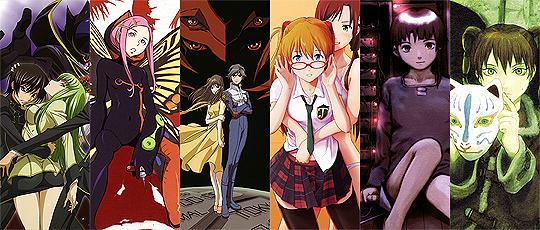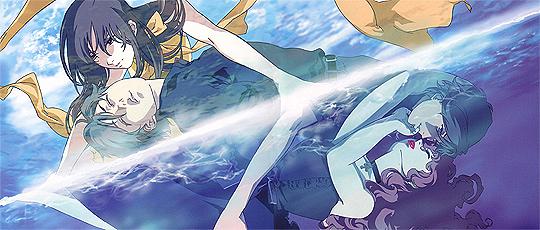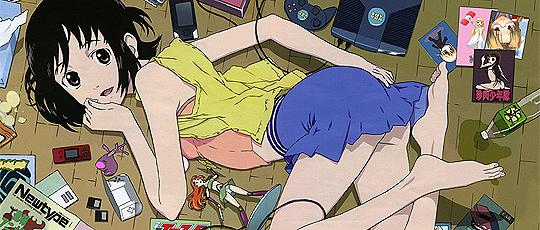Rewatching Code Geass R2 set my mind working on something that has been gnawing at me for a while, and it's only recently that the semblance of an answer began to take form. The part in question takes place towards the end of the season and is when the Emperor's plan is revealed to Lelouch concerning the Mental Elevator, C's world and the Sword of Akasha: that of unifying the world into a single, super consciousness. Depending upon the anime one has watched this will likely be a familiar concept and one that has underpinned many influential and subversive series.
Several years later Serial Experiments Lain was released and took a very technological approach with only a smattering of religion; the aim however was the same as Evangelion: blend everybody's minds together in order to break down the barriers that separate one another. This was done when the eponymous protagonist, Lain, removes the need for devices to access the series' version of the internet, she then gets unlimited access to shape people's memories and the way humanity interacts, but like all other series mentioned here, the final stage is ultimately denied and humanity is spared this intermingling of the their psyches. Lain is commonly attributed as the brainchild of Chiaki J. Konaka who went on to co-write for the similarly bleak Texhnolyze but also wrote the screenplay for several very pivotal episodes of RahXephon.
RahXephon has always commonly been compared with Evangelion for it's similar composition of characters and touching on familiar ideas, the principal one being the Bähbem Foundation which wishes to "tune the world" using the instrumentalists - Ayato and Quon - which, although only obliquely referenced, will end up much like every other attempt to do this. Like Evangelion it uses pseudo-religious overtones to weave this idea into the story with the added wildcard of the Mulians and the Dolems, the "tuning" being the process where both the Mulian and human realities are brought into synergy and everybody ends up all warm and fuzzy and with a greater understanding of Mayan philosophy.
For many years Konaka went silent which dried up the number of shows entertaining this idea; it was around this time that many writers seemed to become disillusioned with the concept which can be seen in the last two shows to feature it heavily and how it was treated. First was Eureka 7, the magnum opus from studio BONES which, as well as surfing robots, featured the story of Earth being taken over by an extra-terrestrial entity known as the Scub - an organic, coral like creature which created a top layer over the planet and, in the climax of the series, wishes to unify with humanity in order to prevent the limit of life that supposedly spells the end of the Earth. Renton, upon hearing this from avatars shown as his sister and father, immediately rejects this as nonsense and the idea is mostly forgotten about. The speed and veracity as to which it was denied is mirrored in Code Geass which sees Lelouch dismiss the Emperor's suggestion as "claptrap" (official translation).
Other anime and manga have toyed with this idea of a singular mind solving humanity's problems with diverse reach such as Berserk and its interpretation of God or even Satoshi Kon's Paprika and its mind-bending dream blending; however there doesn't seem to be one unifying thread connecting all of the interpretations together. Chiaki J. Konaka has contributed to many of them but it has been explored before and after his involvement and although western shows aren't entirely immune to the concept, they seem more disparate and less prominent with aspects such as Star Trek's Deep Space Nine and the Changeling's Great Link the most salient example.
Mostly the idea seems to have grown from recent trends in Japanese pop psychology, namely the idea of honne and tatemae - essentially a person's inner feelings and their outer persona. Once again separating this from the Japan-centric bias is a necessity - and thankfully quite easy as it is a universal psychological system, one that Jung explored with his ideas on individuation; however it is important to examine it from the Japanese angle as, while not unique to that nation, other factors within its society contribute to the prevalence of it in anime. Making vast generalisations and steamrollering over the minutiae of the topic: it is commonly understood that the Japanese created a highly organised industrial nation in the early second half of the 20th century, one which promoted the whole rather than the individual when it came to anything from funding policies to schooling - the result being a mentality that eschews creativity for productivity, individuality for synergy.
From that vantage point it becomes easier to see where the idea of a grand unification comes from, as well as the rejection from it. The concept of everyone becoming one is the ultimate form of a community, the individual is subsumed but remains happy and content. It's an enticing prospect because it removes the tatemae, the façade, and lets everyone be themselves, the honne, in front of their peers, in front of the world. The dismissal of it is most always portrayed as an acceptance that part of individuality is the pain of miscommunication and the burden of emotions. It's likely no surprise that the ones who go through with this process in anime are young children, still building their personality and trying to find a balance between the two opposing forces, also that the ones who come closest to undertaking it are emotionally scarred: Shinji from his father, Ayato from his split from Haruka, Lain and the revelation of her being an experiment. Similarly it is those who are most grounded and able to connect with people on some level that reject it outright: Renton after falling in love with Eureka and Lelouch after he loses Nunnaly, Shirley and Rolo. From this thought process it is only a short step to unfurling the perceived mentality of otaku and the commonly accepted root of the hikkikomori syndrome.
One of the other aspects I noticed in Code Geass was that of Jupiter which cropped up in both Nadesico and recently Gundam 00, however that didn't provide for quite as much meat for investigation.



You explanations make a lot of sense - what with Japan being a conformist society and all, I suppose it's no surprise that it produces so much speculative fiction that deals with individuality, or the reverse of that.
I'm not suggesting that their society is rife with dishonesty and false-ness in terms of how people present themselves to others, but in my short experience with the place first-hand I got a sensation of forced conformity that's hard to put into words. The culture and society felt alien to me but on an individual level, once you get past the obvious language barrier, the people are the same.
I suppose I'm saying in a roundabout way that a society that's strict and conformist in different ways to, say, a Western European one, puts different pressures on its residents and as a result certain themes resonate more in its media and literature. It's certainly something I'd want to investigate and think over at greater length...in the same way that London isn't representative of what the rest of the UK is like, Tokyo is probably an extreme example of Japanese society in general. I certainly don't want to fall into the traps of jumping to conclusions on first impressions or fall into racial stereotyping (in case this comment comes that way).